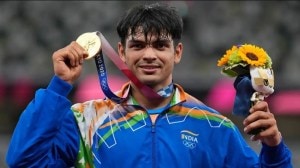Can146;t change our Tory
There's a frisson in the British media ever since David Cameron arrived on the scene. Cameron is fresh-faced and, at 39, the new leader of t...

There8217;s a frisson in the British media ever since David Cameron arrived on the scene. Cameron is fresh-faced and, at 39, the new leader of the Conservative party travels light. He is relatively unburdened by the cynicisms and disbeliefs every politician gathers by the time he rises to a top leadership post in a mainstream political party.
But the media8217;s excitements really have to do with Cameron8217;s policy, or the disorienting set of initiatives the new Tory leader is unveiling, almost one a day. In recently published advertisements in the Telegraph, Times and Mail, he cites poverty and global warming as top Tory priorities. The test of policy will be 8216;8216;not the rich8217;8217; and 8216;8216;we should stand up to big business8217;8217;, he says. Both are sentiments, remarks the shocked-and-awed Guardian columnist, New Labour has never dared own up to.
If Labour8217;s constituency sounds startled by Cameron8217;s impudent incursion into their side of the political fence 8212; on poverty and global warming and also on taxes, public services and immigration 8212; Tory faithful are aghast. Many have lashed out at what they see as the four-week-old leader8217;s attempt to craft a new Labour-lite Conservative Party. Just like Tony Blair, they snipe, Cameron wants to be the young center-ground politician doing well at the polls.
It is an interesting question: Does Cameron8217;s apparent boldness speak of a timid retreat from a position of political-ideological difference, or is it the beginning of a prudent acknowledgement by Britain8217;s 8216;nasty party8217;, for long wallowing in political wilderness, that there are greater returns at the centre in a first-past-the-post system?
Look closer at that question and it triggers further curiosities. Where exactly does the centre lie at any given moment in a polity? Is centrism an articulate position on most issues, or is it the fuzzy anything-goes default option on each one? In the Indian context, what exactly does it mean, apart from an aversion to minority-baiting? Where would a truly centrist party stand on liberalisation, reservations, national security, foreign policy?
Clearly, Britain has a challenging set of questions ahead. And, but for the tragic inarticulateness of the political party in India and our generally permissive climate of political discussion and debate, so would we.
For a flash, such questions were with us too. After Advani8217;s Jinnah thesis, and even before that, after its shock defeat in 2004, the BJP was forced to mull over its future direction. But since then, the party has killed the question with its incoherence, of the kind that was on such embarrassing display in Mumbai recently. And public discussion has obligingly moved on to the more riveting spectacle of Amar Singh raging against Sonia Gandhi.
The BJP8217;s 25 year celebrations cum stocktaking is memorable only for the array of factional intrigues showcased by the party. It is all too easy to forget that the party that went to Mumbai was in the throes of a promising political crisis. Promising, for what it might have told us about the future shape of a party of the right in a first-past-the-post system that is far more diverse than Britain8217;s.
India8217;s diversity demands that any defensible political agenda should take on board a respect for the minorities. The first-past-the-post system would appear to make a broad centrist appeal a strong attribute of winnability, and in these times of power-sharing at the Centre, of coalitionability. He may have been only playing for primeministership, but even in the throes of that limited ambition, L.K. Advani seemed to gesture to this reality when he delivered his Jinnah speech in Pakistan.
But his party has squelched the challenge to define a more centrist agenda for itself. It has done so by being abjectly subservient to the RSS. It has done so, most of all, by the simple expedient of refusing to put this dilemma into words: having tasted power once on a relatively moderate agenda 8212; an often spurious moderation, as it was shown up to be in Gujarat, but a kind of moderation still 8212; is it possible or desirable to return to a 8216;8216;purer8217;8217;, more singular identity?
At Mumbai, the party blamed the Congress for its own ills. It immersed itself in factional bickerings. It conspired to bring about the eerie backroom transfer of the baton to Rajnath Singh, who tried to paper over the awkwardness at his coronation in Delhi with a slogan and an alliteration. 8216;8216;Bharat mata, janata, annadata,8217;8217; sang Singh.
Ironically, the BJP8217;s incoherence has also kept it from getting a real measure of its own success in the past decade and more. Had it allowed itself to debate the necessity of moving to the polity8217;s centre in Mumbai, it might have discovered that the new centre-point is largely of its own marking. To a large extent, be it on secularism or on the economy, the BJP has shifted the political mean to the right.
The BJP8217;s incoherence is a let-down for another reason: because the onus of articulation was on the party. In its best version, the BJP challenged the accumulated inertia and corruption of the Congress system. It wasn8217;t alone in this, of course. Congress dominance was also challenged by the array of regional and caste-based parties that rode the Mandal wave to demand their share of power at the Centre.
But the democratic possibilities of this challenge are withering away. In the absence of a more articulate and responsible politics within the BJP, or inside the SP-BSP-RJD, and in an environment in which these parties face no real penalties for their many abdications, the BJP can lurch from the ghastly extreme to a centrepoint and back again 8212; no questions asked, no political depths stirred.
It is not for us, it seems, the privilege of grappling with daring questions about a party8217;s trajectory, as they are doing right now in Britain. We don8217;t wonder about the party8217;s evolution here. Ours is the arid spectacle of the mindless gyration of the party.
- 01
- 02
- 03
- 04
- 05






























